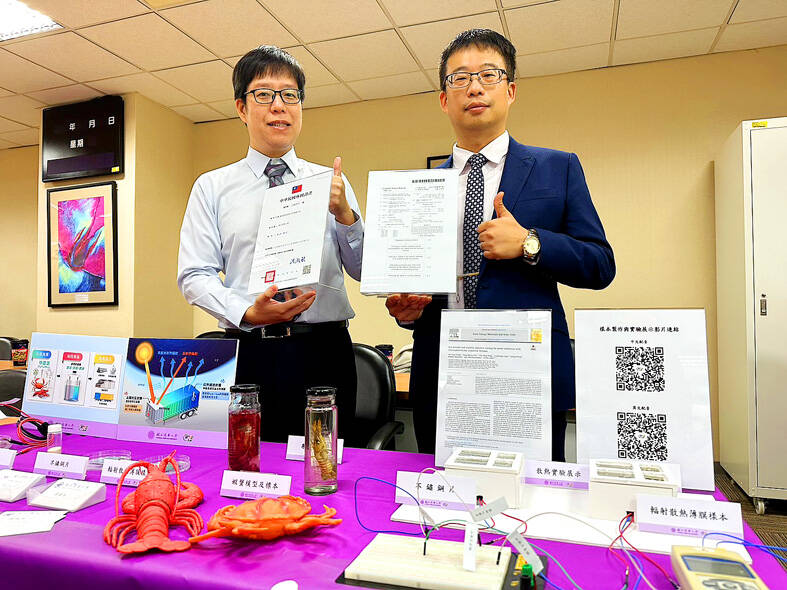A team made up of researchers from National Tsing Hua University (NTHU) and National Yang Ming Chiao Tung University (NYMCU) has developed a heat dissipation coating material made of chitin that could help the transportation industry reduce power consumption and government efforts to be environmentally friendly.
The transportation industry sometimes uses fans or air-conditioners to help dissipate heat, as well as carbon dioxide, contributing to climate change effects.
The team, headed by NTHU professor Chen Yu-bin (陳玉彬) and NYMCU professor Chang Jui-yung (張瑞永), used bio waste such as shrimp and crab shells to create a film that is applied to metal surfaces via electroplating.

Photo: Yang Yuan-ting, Taipei Times
The material is capable of lowering the heat of metal surfaces by at least 2.8°C, and at most 7.1°C, the team said.
Chen said that the material, made of extracted chitin from bio waste, does not absorb infrared rays and could effectively dissipate heat via radiation.
The production process could be completed without the use of electricity, and the material could effectively reduce the heat of the metal plates it covers, Chen said, adding that the material functions,“like an air-conditioner that does not require electricity, but cannot maintain a fixed temperature.”
Chitin is a decomposable material and its manufacturing does not require specially created environments, such as high-heat or a vacuum, Chen said.
It could be used for vehicles, train cars or on transportation containers and metal storage devices, he added.
If applied to stainless steel products, the chitin coating’s heat dissipation effect is increased by 1.3 times compared with a conventional pre-coating, and its heat dissipation effects could be increased by 45 times if applied to products made with platinum, he said.
The team coated a standard container used for cold-chain transportation and found that the container decreased power consumption by 58,000Wph, Chang said.
Scientists worldwide are looking to develop heat dissipation materials, but the chitin-based material is not only the first to be made from decomposable materials, but also the first to be manufactured in an environmentally friendly manner, Chen said.
The team has tested the material’s durability when exposed to weather and found that it could last up to three months before needing to be reapplied to the containers, Chen said.
Patents for the material have been obtained in the US and Taiwan, and research on it has also been published in an international journal, Chen said, adding that the team expects to conclude talks and transfer the technology to businesses by the end of the year.

Taiwan’s Liu Ming-i, right, who also goes by the name Ray Liu, poses with a Chinese Taipei flag after winning the gold medal in the men’s physique 170cm competition at the International Fitness and Bodybuilding Federation Asian Championship in Ajman, United Arab Emirates, yesterday.

Costa Rica sent a group of intelligence officials to Taiwan for a short-term training program, the first time the Central American country has done so since the countries ended official diplomatic relations in 2007, a Costa Rican media outlet reported last week. Five officials from the Costa Rican Directorate of Intelligence and Security last month spent 23 days in Taipei undergoing a series of training sessions focused on national security, La Nacion reported on Friday, quoting unnamed sources. The Costa Rican government has not confirmed the report. The Chinese embassy in Costa Rica protested the news, saying in a statement issued the same

A year-long renovation of Taipei’s Bangka Park (艋舺公園) began yesterday, as city workers fenced off the site and cleared out belongings left by homeless residents who had been living there. Despite protests from displaced residents, a city official defended the government’s relocation efforts, saying transitional housing has been offered. The renovation of the park in Taipei’s Wanhua District (萬華), near Longshan Temple (龍山寺), began at 9am yesterday, as about 20 homeless people packed their belongings and left after being asked to move by city personnel. Among them was a 90-year-old woman surnamed Wang (王), who last week said that she had no plans

TO BE APPEALED: The environment ministry said coal reduction goals had to be reached within two months, which was against the principle of legitimate expectation The Taipei High Administrative Court on Thursday ruled in favor of the Taichung Environmental Protection Bureau in its administrative litigation against the Ministry of Environment for the rescission of a NT$18 million fine (US$609,570) imposed by the bureau on the Taichung Power Plant in 2019 for alleged excess coal power generation. The bureau in November 2019 revised what it said was a “slip of the pen” in the text of the operating permit granted to the plant — which is run by Taiwan Power Co (Taipower) — in October 2017. The permit originally read: “reduce coal use by 40 percent from Jan.